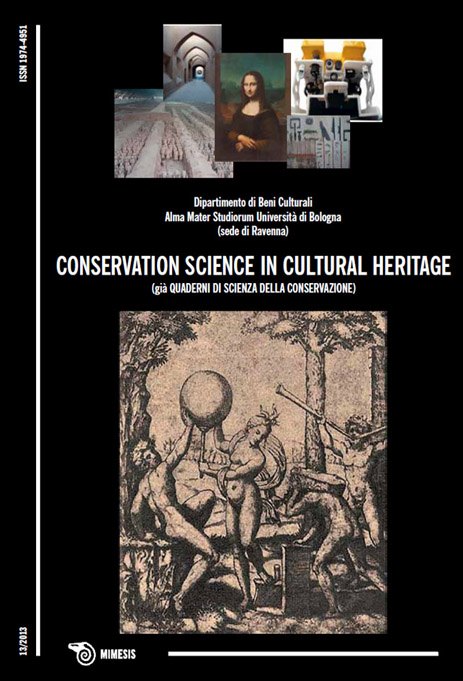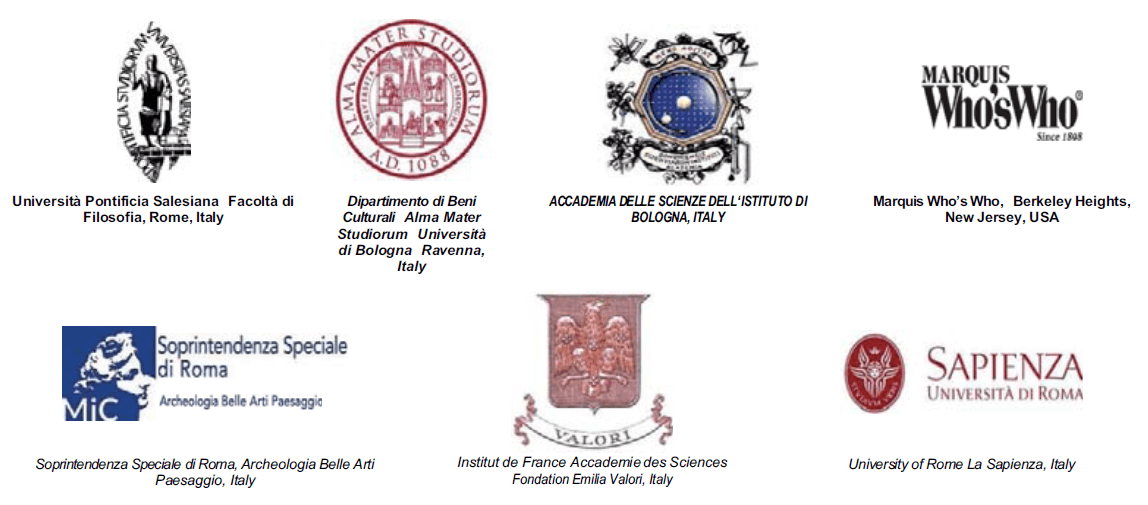Archaeology and Science in China
DOI:
https://doi.org/10.6092/issn.1973-9494/4177Keywords:
cultural heritage, China, innovative technologies, environmental safeguardAbstract
Summary
The monuments and historical memories of a people are its non-biological DNA, through which a political system creates its identity. Archaeological research, the protection and valorization of artistic heritage in China envisages the glorification of Beijing’s unifying power, recreating, through the business of cultural and archaeological tourism, sustained economic development, especially in depressed areas, also by taking into consideration the relationship between ecology, cultural heritage and economic development. Protecting Chinese artistic and archaeological structures fosters the interest of the government for leading-edge technologies used in discovering, protecting and managing the most delicate and complex finds. Italy can supply Beijing with these technologies, together with the know-how, developed over many years of care and analysis of some of the world’s greatest artistic heritage. With the use of these technologies, in accordance with legislation related to environmental protection, artistic and archaeological finds can be studied thoroughly and rapidly, thus providing the possibility of learning about the context in which a work is inserted and allowing the whole site to be valorized.
Riassunto
I monumenti e le memorie storiche di un popolo sono il suo DNA non biologico, attraverso cui un sistema politico crea la sua identità. La ricerca archeologica, la protezione e la valorizzazione dei beni artistici in Cina prevedono la glorificazione del potere unitario di Pechino,ricreando, tramite il business del turismo culturale e archeologico, uno sviluppo economico sostenuto, soprattutto in aree depresse, e tenendo anche in considerazione il rapporto tra ecologia, patrimonio culturale e sviluppo economico. Nel contesto della salvaguardia delle strutture artistiche ed archeologiche cinesi si innesca l’interesse del Governo per le tecnologie di punta relative al rinvenimento, alla protezione e gestione dei reperti più delicati o complessi, che possono essere fornite a Pechino dall’Italia unitamente al know-how, sviluppatosi in tanti anni di cura e analisi di uno dei più grandi patrimoni artistici al mondo. Con l’utilizzo di queste tecnologie, rispondenti ad una normativa nel rispetto della salvaguardia ambientale,i reperti artistici e archeologici possono essere studiati completamente e in tempi rapidi, dando inoltre la possibilità di conoscere il contesto in cui un’opera è inserita e permettendo, quindi, la valorizzazione dell’intero sito.
Résumé
Les monuments et les mémoires historiques d’un peuple sont son ADN non biologique, grâce auquel un système politique crée sa propre identité. La recherche archéologique, la protection et la valorisation des biens artistiques en Chine impliquent la glorification du pouvoir central de Pékin et recréent un développement économique soutenu, principalement dans les régions défavorisées, par le biais du tourisme culturel et archéologique ; en même temps, elles tiennent compte du rapport entre l’écologie, le patrimoine culturel et le développement économique. Dans le contexte de la préservation des structures artistiques et archéologiques chinoises, on constate l’intérêt du Gouvernement pour les technologies de pointe relatives à la découverte, à la protection et à la gestion des pièces les plus délicates ou complexes, que l’Italie peut fournir à Pékin en même temps que le savoir-faire qu’elle a développé sur des années de soins et d’analyses de l’un des plus grands patrimoines artistiques au monde. L’utilisation de ces technologies conformes aux normes de protection de l’environnement assure une étude complète et rapide des pièces artistiques et archéologiques, avec de plus la possibilité de connaître la mise en contexte de l’ouvrage, ce qui permet de valoriser l’ensemble du site.
Zusammenfassung
Die Monumente und die historischen Erinnerungen eines Volks stellen dessen nicht biologische DNS dar, auf der ein politisches System seine Identität aufbaut. Die archäologische Forschung, der Schutz und die Aufwertung der Kunstgüter in China umfasst die Verherrlichung der Einheitsmacht von Peking und schafft durch das Business des kulturellen und archäologischen Tourismus eine nachhaltige Wirtschaftsentwicklung, besonders in Notstandsgebieten, wobei auch die Beziehung zwischen Ökologie, Kulturbestand und wirtschaftlicher Entwicklung berücksichtigt wird. Im Rahmen der Wahrung der künstlerischen und archäologischen Strukturen Chinas erwacht das Interesse der Regierung für die Spitzentechnologien in Bezug auf Auffindung, Schutz und Verwaltung der empfindlichsten oder komplexesten Funde, die Peking von Italien zusammen mit dem Know-How geliefert werden können, das sich in langen Jahren der Pflege und Analyse eines der größten Kunstbestände der Welt entwickelt hat. Durch Anwendung dieser Technologien, die einer auch den Schutz der Umwelt umfassenden Vorschrift entsprechen, können künstlerische und archäologische Funde vollständig und in kurzer Zeit untersucht werden, wobei auch die Möglichkeit gegeben ist, das Umfeld kennenzulernen, in das ein Werk sich einfügt, und somit den gesamten Standort zur Geltung zu bringen.
Resumen
Los monumentos y las memorias históricas de un pueblo constituyen su ADN no biológico, a través del cual un sistema político crea su identidad. En China, la investigación arqueológica, la protección y la valorización de los bienes artísticos suponen la glorificación del poder unitario de Pekín, y animan, por medio del negocio del turismo cultural y arqueológico, el desarrollo económico sostenido, sobretodo en regiones deprimidas, y también toman en cuenta la relación que existe entre ecología, patrimonio cultural y desarrollo económico. En el ámbito de la salvaguardia de las estructuras artísticas y arqueológicas chinas nace el interés del Gobierno hacia la tecnología de punta por lo que se refiere al hallazgo, la protección y la gestión de los vestigios más delicados o complejos, tecnología que Italia podría proporcionar a Pekín, junto con el conocimiento y la competencia desarrollados a lo largo de años de cuidado y análisis de uno de los patrimonios artísticos más grandes del mundo. Utilizando dicha tecnología, que responde a una normativa de respeto de la protección del medioambiente, es posible estudiar vestigios artísticos y arqueológicos por completo y en poco tiempo y, además, se puede brindar la posibilidad de conocer el contexto al que pertenece una obra y, de esta forma, valorizar el sitio en su totalidad.
Резюме
Памятники и историческая память народа являются его не биологическим ДНК, через которое политическая система создает свою собственную идентичность. Археологические исследования и популяризация творческого наследия в Китае предусматривают прославление унитарной власти Пекина, создавая посредством культурного и археологического турбизнеса устойчивое экономическое развитие, прежде всего в слаборазвитых зонах и, учитывая при этом взаимосвязь экологии, культурного наследия и экономического развития. В контексте охраны китайских художественных и археологических памятников проявляется интерес со стороны Правительства к передовым технологиям относительно открытий, защиты и сохранности наиболее хрупких и сложных находок, технологии, которые Италия может предоставить Пекину вместе с know-how, разработанным на протяжении многолетнего анализа и ухода за одним из величайших художественных наследий мира. С использованием этих технологий, отвечающих правилам по охране окружающей среды, эти художественные и археологические находки могут быть полностью изучены в короткие сроки, давая кроме этого возможность ознакомиться с контекстом, в котором было помещено произведение исскуства и, следовательно, оценить место раскопок в целом.
摘要
名声古迹和历史记忆是一个民族的非生物DNA以及可产生其政治制度的身份。
在中国考古研究和艺术遗产的保护和发扬用来强调北京中央权力的歌颂; 通过文化与考古的旅游商业开发了一种可持续的经济发展,尤其在贫困地区,并且考虑到生态,文化遗产与经济发展的相互关系。
关于中国的艺术与考古结构的保护,中国政府开始寻找用于发掘、保护和管理较复杂和易碎文物的先进技术; 因此意大利,由其世界伟大的文化遗产保护与研究上具有丰富的经验,可以给北京政府提供相关设备和技术诀窍。通过使用这些符合环境保护法规的技术,可以全面及迅速地进行艺术和考古文物的研究,令人们认识文物发掘地并且发扬整个考古遗址。
Downloads
Published
How to Cite
Issue
Section
License
Copyright (c) 2013 Giancarlo Elia Valori
Copyrights and publishing rights of all the texts on this journal belong to the respective authors without restrictions. Authors grant the journal right of first publication.
This journal is licensed under a Creative Commons Attribution 4.0 International License (full legal code).
See also our Open Access Policy.






